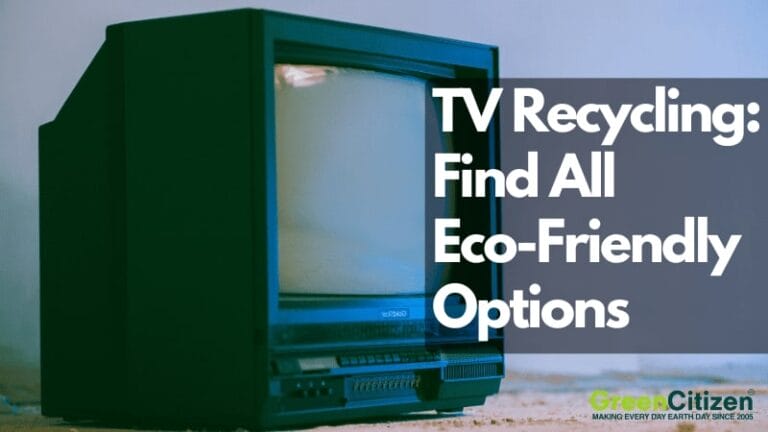That old TV in your garage? It’s not just taking up space — it’s toxic waste in disguise.
Whether it’s a heavy CRT or a busted flat-screen, tossing a TV in the trash isn’t just illegal in many states — it’s a serious environmental threat. These devices contain lead, mercury, and other hazardous materials that can leach into soil and water when sent to landfills.
TV recycling isn’t optional — it’s the only safe way to get rid of your old screen.
If you’re wondering “How do I recycle my old TV near me?” or “Where can I drop off a broken television?” — you’re in the right place. In this guide, we’ll show you the safest, most responsible ways to dispose of TVs, how to prep them for recycling, and where to find certified e-waste centers that accept all types of TVs — including bulky consoles, smart TVs, and everything in between.
Key Takeaway: How to Recycle a TV the Right Way
To recycle your TV safely, never throw it in the trash. Instead, find a certified e-waste recycler, local collection event, or drop-off site that accepts TVs. TV recycling centers handle flat screens, CRTs, and smart TVs, ensuring proper disposal of toxic components like lead and mercury. Use our Green Directory to find TV recycling near you.
How to Recycle Every Type of TV: CRT, Projection, Plasma, LCD, and LED
Not all TVs are created equal — and neither are their recycling needs. From toxic lead in CRTs to mercury in projection units, different television types contain different materials and require specific recycling methods.
Here’s how to responsibly dispose of every kind of TV, from old-school box sets to today’s ultra-thin flat screens.
CRT TV Recycling: Why It’s Risky and Where to Do It
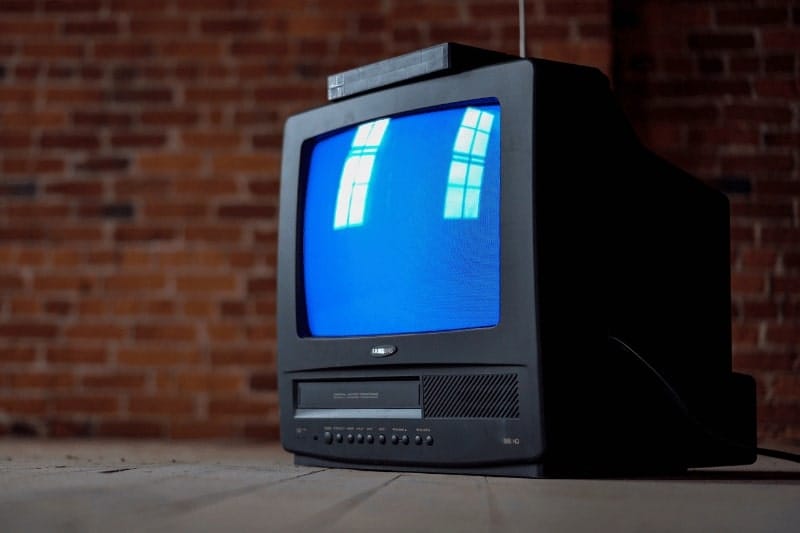
Old CRT (Cathode Ray Tube) TVs — the bulky ones with curved glass — may look harmless, but they can contain 4–8 pounds of lead, along with mercury, cadmium, and barium. These hazardous materials are highly toxic if released into soil or groundwater.
To recycle a CRT TV safely, don’t drop it at a regular landfill or curb. Instead, take it to a certified e-waste recycling center that handles cathode ray tubes.
These facilities have the tools to safely dismantle and recover dangerous components, keeping toxins out of the environment.
How to Recycle Projection TVs with Mercury Lamps
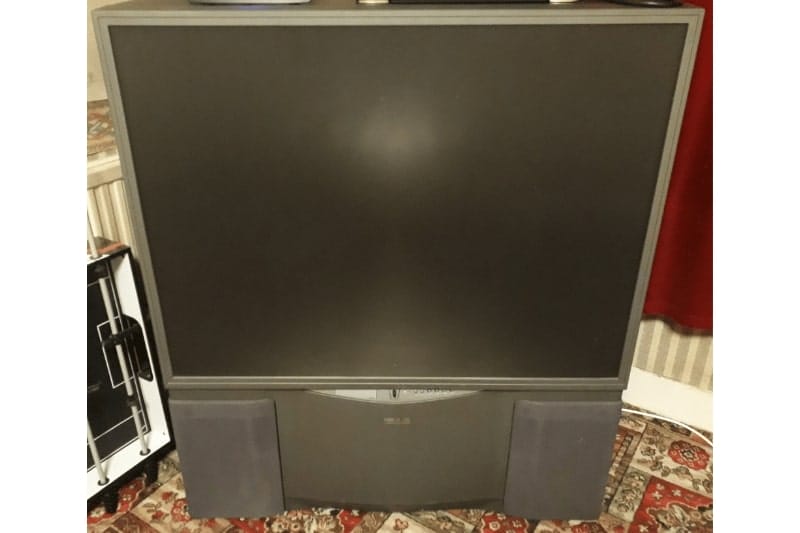
Projection TVs, popular in the early 2000s, often use mercury vapor lamps to create their image. These bulbs can release dangerous fumes if broken, so tossing them in the trash is a major no-go.
Certified recyclers know how to safely remove and process the lamps inside projection TVs. You can usually drop them off at a TV recycling center or bring them to electronics collection events in your area.
Avoid DIY removal, as mercury exposure is a serious health risk.
Plasma TV Disposal: What Makes It Hazardous
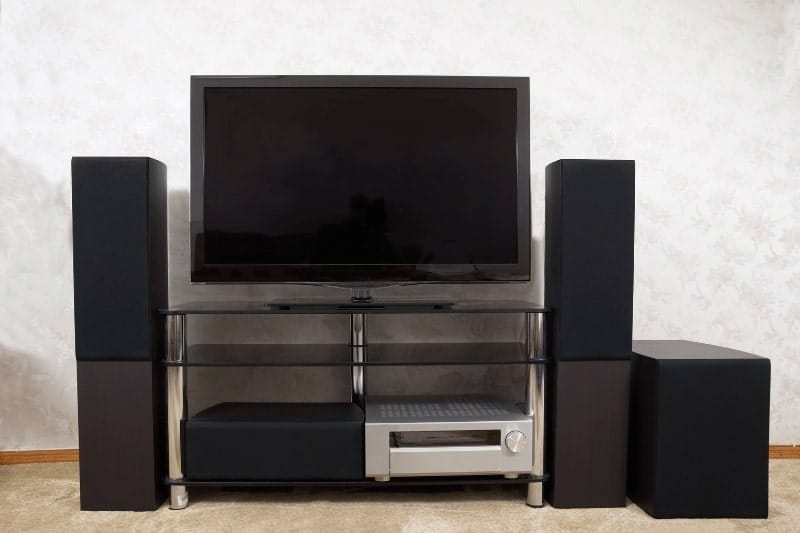
Plasma TVs contain phosphors, mercury, barium, beryllium, and cadmium — all of which are dangerous to humans and wildlife. While they look like modern flat screens, plasma displays require extra caution during disposal.
Your best option? Find a recycler that specializes in older TVs and hazardous e-waste. Plasma TVs often need manual disassembly to recover their components safely, so don’t leave them with general recyclers or scrap yards.
How to Recycle LED and LCD TVs the Right Way

LED and LCD TVs may be more eco-friendly during use, but they still include circuit boards, backlights with trace mercury, and non-biodegradable plastics. And with more of these TVs being discarded each year, responsible recycling matters more than ever.
Check if the manufacturer offers a TV take-back program — many brands now recycle their own products for free. You can also bring your flat screen to a local e-waste drop-off site or electronics retailer that partners with certified recyclers. This ensures valuable components are recovered, and toxic ones are kept out of landfills.
6 Best TV Recycling Options (Including Free and Local Drop-Off)
Looking to dispose of an old television safely and legally?
Whether it’s a broken CRT, outdated flat-screen, or a working smart TV, here are six responsible, environmentally sound ways to recycle it — including free and local options.
1. Recycle Your TV at a Certified E-Waste Center
A certified e-waste recycling center is your safest and most eco-friendly option. These facilities are trained to handle TVs containing hazardous substances like lead, mercury, phosphor, and barium — ensuring these materials are properly extracted and kept out of landfills.
If you’re located in the San Francisco Bay Area, GreenCitizen offers free TV recycling at our Burlingame EcoCenter — no matter the brand or TV type.
Outside the Bay Area? Use the Green Directory to find certified TV recycling centers near you.
2. Use a Manufacturer TV Take-Back Program
Many TV manufacturers offer take-back programs to make recycling easier and meet e-waste regulations. Here’s how top brands handle TV recycling:
- LG: Offers drop-off and free mail-in recycling via its locator tool.
- Samsung: Accepts TVs, phones, and appliances through nationwide recycling partners.
- Sony: Recycles TVs through its partner ERI, with drop-off and free mail-in options.
- TCL: Partners with local sites and recently won awards for its electronics recycling efforts.
Search the brand’s recycling page or use their zip-code tools to find drop-off sites near you.
3. Drop It Off at Best Buy (Up to 3 Items/Day)
Best Buy’s electronics recycling program is among the most accessible in the U.S. You can drop off up to three electronics per household, per day, including old TVs. It’s perfect if you’re already shopping for a new television.
Note: Some states or stores may charge a small recycling fee, especially for large TVs, so check ahead.
4. Check with Your Local Recycling or Waste Center
Your city or county may operate a municipal electronics recycling center or host household hazardous waste collection events. These programs often accept TVs — including CRTs and flat screens — for proper disposal.
Call your local public works department to confirm accepted items, hours, and whether drop-offs are free or fee-based.
5. Donate Working TVs to Charities or Nonprofits
If your TV still works, consider donating it. Many charities accept flat-panel TVs, especially for community centers, shelters, or low-income families. Just make sure to erase any stored data — including streaming login info or media files.
Donation options include:
- Goodwill: Accepts flat-panel TVs (no CRTs); call your local branch to check capacity.
- The Salvation Army: Offers drop-off and donation receipts.
- Donation Town: Lets you schedule free pickups for working TVs and connects you with local charities.

6. Sell or Give Away Your Old TV
Some TVs still have resale value, especially smart TVs in good condition. Try listing yours on:
- Facebook Marketplace
- Craigslist
- Nextdoor
Even if you make just a few dollars, it can go toward your next upgrade — and it keeps electronics out of the landfill.
TL;DR: How to Recycle an Old TV
Recycle your old TV by using certified e-waste centers, manufacturer take-back programs, or drop-off sites like Best Buy. You can also donate working TVs to charities or sell them locally. Always erase personal data before donating, and avoid throwing TVs in the trash due to hazardous components like lead and mercury.

Read More:
Why TV Recycling Matters: 4 Big Reasons to Do It Right
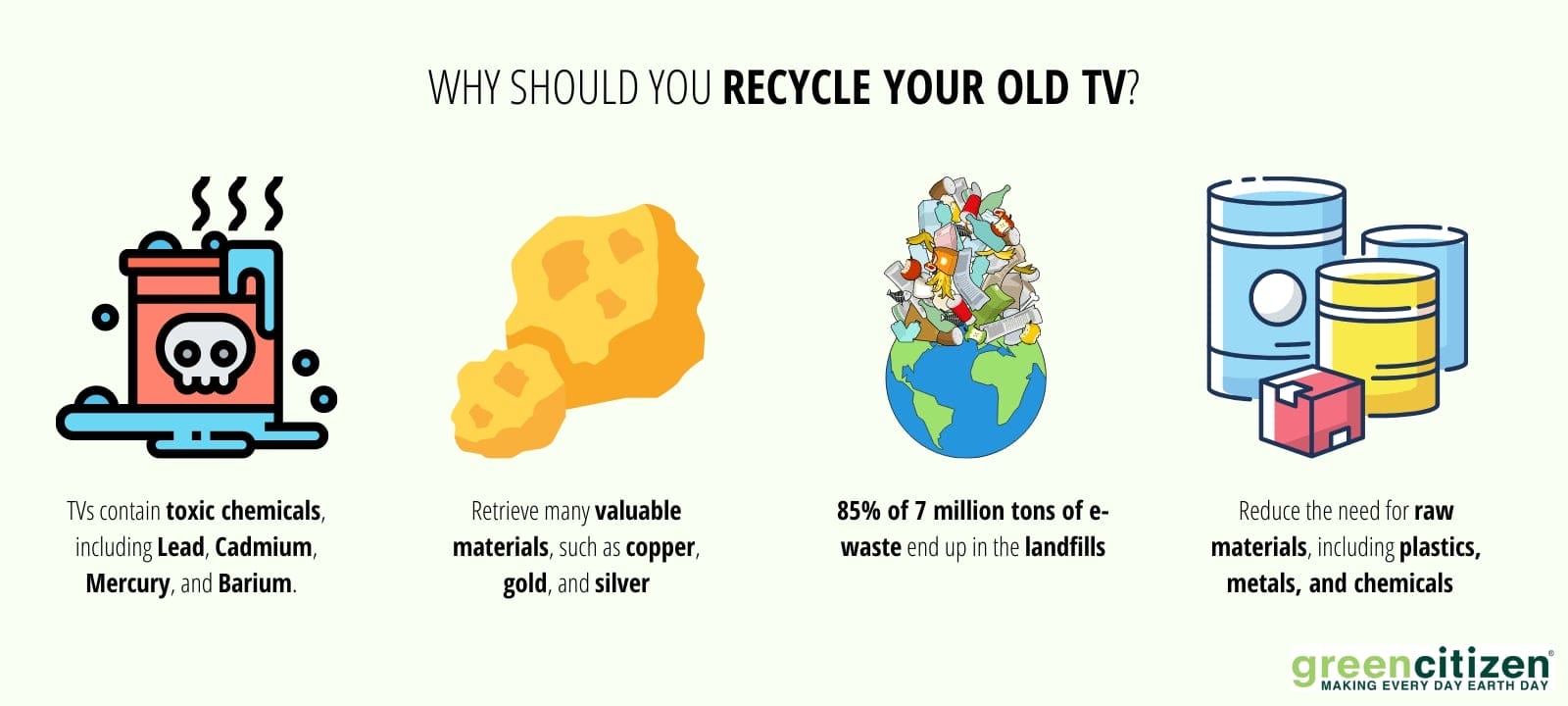
1. TVs Contain Hazardous Materials Like Lead and Mercury
Televisions — especially CRTs and older flat screens — can contain lead, mercury, cadmium, and barium. If tossed in landfills, these chemicals can leach into soil and water, damaging ecosystems and harming human health. Certified e-waste recyclers prevent this by safely extracting and processing toxic components.
2. TV Recycling Recovers Valuable Metals
Inside your TV are trace amounts of copper, gold, and silver. While small per device, they add up across millions of TVs. Certified recycling facilities recover these materials and prevent “strip-and-dump” operations from trashing the rest into landfills.
3. You’ll Help Reduce E-Waste in Landfills
In 2019, Americans generated nearly 7 million tons of e-waste, but only 15% was recycled. TVs make up a large portion of that waste. Recycling keeps these bulky items out of landfills and diverts them into responsible reuse or material recovery.
4. It Preserves Natural Resources and Reduces Mining
TV production requires raw materials like plastic, rare metals, and chemicals — often extracted through environmentally harmful mining. By recycling your old television, you support closed-loop manufacturing, reduce the need for new resource extraction, and lower the carbon footprint of future electronics.

Read More:
Can You Throw TVs in the Trash?
In most cases, no — you should never throw a TV in the trash or leave it at the curb.
Many states have banned televisions and other electronics from landfills due to the toxic materials they contain, such as lead, mercury, and cadmium. Even in states where it’s not explicitly illegal, throwing a TV in the trash can lead to environmental harm and local fines.
Do TV Disposal Laws Exist in Every State?
As of now, 28 states have formal e-waste recycling laws. These regulations often require:
- Manufacturers to offer TV recycling programs
- Retailers to accept returns of old electronics
- Households and businesses to recycle electronics rather than trashing them
However, these laws vary — and not all of them outright ban landfill disposal.
States Without E-Waste Recycling Laws (as of 2025)
Residents in these states should be extra cautious, as there may be no formal programs or protections:
Alaska, Alabama, Arkansas, Arizona, Delaware, Florida, Georgia, Idaho, Kansas, Kentucky, Louisiana, Massachusetts, Montana, Nevada, New Hampshire, New Mexico, North Dakota, Ohio, South Dakota, Tennessee, Wyoming
If you live in one of these 22 states, look for a certified electronics recycler to prevent harmful materials from entering landfills.
The Safer, Smarter Alternative: Certified TV Recycling
Even if your state allows landfill disposal, it doesn’t mean it’s the right choice.
Certified e-waste recycling centers ensure your old television is:
- Handled responsibly
- Processed without harming the environment
- Stripped of valuable materials for reuse
Use the Green Directory to find nearby drop-off locations that accept all types of TVs — including CRT, plasma, and LCD units.
Frequently Asked Questions (FAQ)
You can recycle an old TV at GreenCitizen’s Bay Area facility. For other locations, use our Green Directory to find nearby recycling providers.
No, Staples doesn’t recycle old TVs. As an alternative, you can drop off old electronics, including TVs, at Best Buy locations.
Yes, Best Buy accepts old TVs for free. This is especially convenient if you’re buying a new TV, saving you an extra trip.
Walmart accepts TVs for recycling, but this service is only free if you purchase a new device at the same time.
You can dispose of your old flat-screen TV for free at a certified recycling provider. Note that older CRT TVs may require a small fee for recycling.
Some old TVs may have minimal resale value, depending on their age and condition. Alternatively, donating to charity can be a more rewarding option.
Old TV remotes can be recycled with your TV at most e-waste centers, where they will be either reused or responsibly recycled.
Yes, TV remotes are e-waste. Like TVs, they contain metals and potentially harmful substances, so proper disposal is essential.

Read More:
Take the Smart Way Out: Recycle Your Old TV the Right Way
Throwing away a TV isn’t just wasteful — in many places, it’s illegal and harmful to the planet. With lead, mercury, and other toxins hiding inside, even one television in the trash can do real damage.
Luckily, TV recycling is easier than ever. If you’re in the San Francisco Bay Area, drop your old TV off for free at GreenCitizen’s EcoCenter. Not nearby? Use our Green Directory to find certified TV recycling near you — from CRTs to flat screens.
Don’t let your old television end up in a landfill. Take action today and help build a cleaner, safer future.
